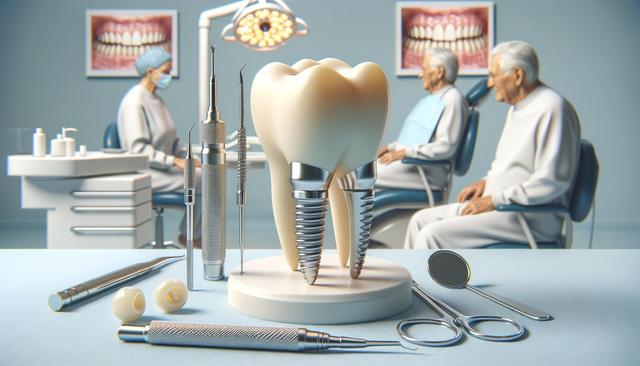The Importance of Dental Implants for Seniors
As people age, dental health becomes increasingly critical, especially when natural teeth are lost due to decay, gum disease, or injury. Dental implants provide a durable and functional replacement that closely mimics the look and feel of natural teeth. Unlike dentures, which can shift or cause discomfort over time, implants are fixed into the jawbone, offering a more stable and permanent solution. For seniors, this can mean improved nutrition, clearer speech, and enhanced self-esteem.
Seamless dental implants, in particular, are designed to integrate smoothly with existing teeth for a more natural aesthetic. They are crafted to minimize the appearance of artificiality, which is a key concern for many seniors. These implants also reduce long-term oral hygiene issues often associated with removable dentures. Overall, they represent a significant improvement in quality of life for older adults seeking independence and comfort in their daily routines.
Cost Breakdown of Seamless Dental Implants
The cost of seamless dental implants can vary considerably based on several factors, including geographic location, the patient’s oral health, and the clinic’s reputation. On average, seniors can expect to pay between $3,000 and $6,000 per implant. This estimate includes the cost of the implant device, abutment, and crown, as well as surgical fees. However, full-mouth restoration procedures can reach upwards of $25,000 to $50,000 depending on complexity.
Additional costs may include:
- Initial consultations and diagnostic imaging (X-rays, CT scans)
- Bone grafting procedures if jawbone density is insufficient
- Follow-up appointments and maintenance care
It’s important for seniors to consider what is included in a clinic’s package pricing, as some may offer bundled services that provide better overall value. Dental insurance typically does not cover implants, although some supplemental plans designed for older adults may offer partial assistance. Financing options or payment plans are also commonly available through many dental providers.
Top-Rated Hospitals and Clinics for Senior Dental Implants
Choosing the right facility for dental implants is essential, especially for seniors who may have additional health concerns. Several hospitals and dental care centers are well-regarded for their implant services and geriatric dental care specialization. These institutions often have experienced oral surgeons, advanced technology, and patient-centered care models tailored to older adults.
While brand names cannot be mentioned, some characteristics of renowned hospitals and clinics offering top-tier implant services include:
- Accreditation from national dental associations
- Specialized geriatric dental departments
- Access to 3D imaging and computer-guided implant placement
- Support for sedation options and post-operative care
Seniors are encouraged to look for clinics with a dedicated patient coordinator who can assist with treatment planning, cost estimation, and scheduling. Reading patient reviews and seeking recommendations from general practitioners can also aid in making informed choices.
Factors That Influence Implant Success in Older Adults
While age is not necessarily a limiting factor for dental implants, there are several conditions that can influence success rates among seniors. Bone density, overall health, and oral hygiene practices all play significant roles in determining whether implants will integrate successfully with the jawbone. Medical conditions such as diabetes or osteoporosis may require additional preparation or monitoring during the implant process.
To increase the likelihood of a successful outcome, seniors should:
- Undergo thorough medical and dental evaluations
- Follow pre- and post-operative care instructions closely
- Quit smoking, which can impede healing and implant integration
- Maintain regular follow-up visits for cleaning and checkups
Many dental specialists now use advanced tools like digital scans and surgical guides to enhance precision and reduce recovery time. These innovations are particularly beneficial for older patients, as they minimize discomfort and improve overall treatment success.
Planning for Long-Term Maintenance and Care
Once the implants are in place, long-term maintenance is key to preserving their integrity. Unlike dentures, implants do not require removal for cleaning, but they still need consistent oral hygiene. Seniors should brush and floss daily, use antimicrobial mouth rinses if recommended, and attend bi-annual dental checkups to monitor implant health.
Signs that may indicate a problem with an implant include:
- Persistent pain or discomfort at the implant site
- Swelling or bleeding of the surrounding gums
- Changes in bite or alignment
Preventive care remains the best approach to protecting the investment made in dental implants. Many clinics offer maintenance packages or reminders to help seniors stay on track with their care routines. With proper upkeep, implants can last 20 years or more, making them a valuable long-term solution.
Conclusion: A Smart Investment in Senior Health and Well-being
For seniors seeking a reliable and aesthetically pleasing way to restore their smile, seamless dental implants offer a viable solution. While the upfront costs can be significant, the long-term functional and psychological benefits often outweigh the investment. By selecting a hospital or clinic with a strong reputation for senior care, understanding the financial aspects, and committing to proper maintenance, older adults can enjoy improved oral health and quality of life for years to come. As with any medical procedure, consultation with a qualified dental professional is essential to determine the most appropriate course of care.


